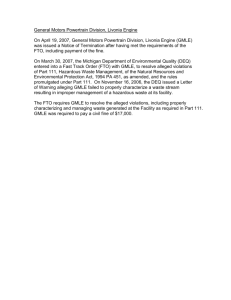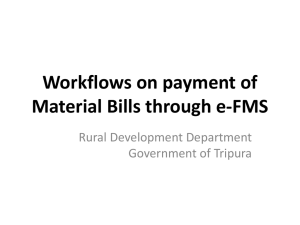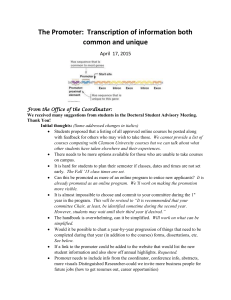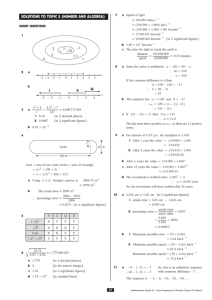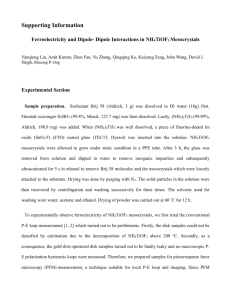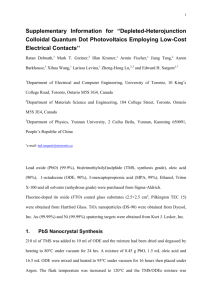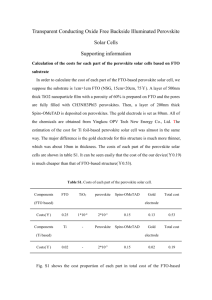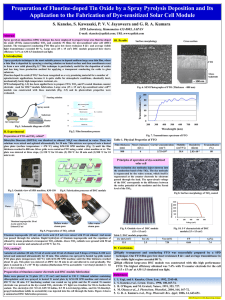Presentation slides (PowerPoint, 0.5MB)
advertisement
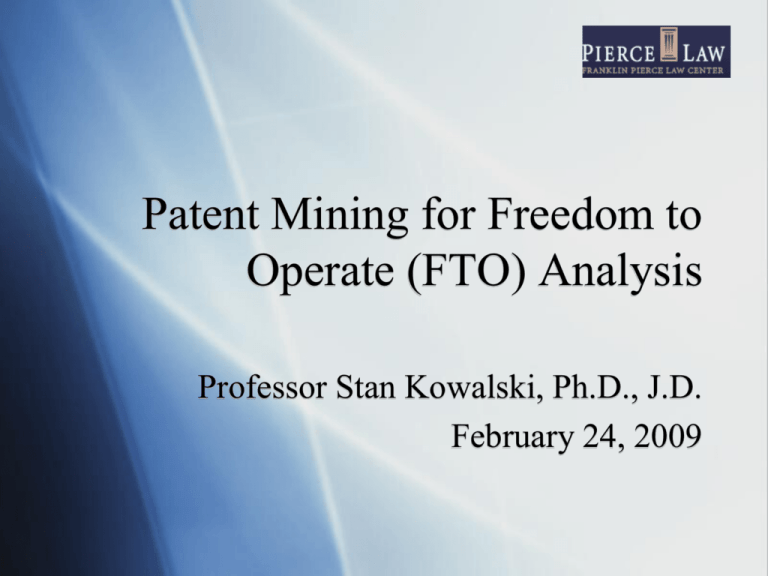
Patent Mining for Freedom to Operate (FTO) Analysis Professor Stan Kowalski, Ph.D., J.D. February 24, 2009 FTO Principles Freedom to operate (FTO) is the ability to proceed with research, development and commercialization of a product, while fully accounting for any potential risks of infringing activity, i.e., whether a product can be made, used, sold, offered for sale, or exported, with a minimal risk of infringing the unlicensed intellectual property rights (IPR) or tangible property rights (TPR) of others. FTO Principles The term “freedom” in FTO does not imply an absolute freedom or guarantee, but instead indicates a carefully executed analysis leading to a reasoned opinion that one can legally proceed with research, development or sale, in a given jurisdiction at a given point in time. FTO Principles FTO analysis (the assessment of potential IPR and TPR appurtenant to a product) is about risk management: providing the maximum amount of sound information and proficient analysis, such that informed decisions are made, and a reasonable course of action taken. FTO Principles FTO Opinion Based on the results of the FTO analysis, patent counsel will draft an FTO opinion that indicates the likelihood that the product or process infringes the IPR or TPR of others. Such infringement likelihood might be either low or high, depending on the results of the FTO analysis. FTO Principles FTO Analysis, leading to Product Clearance FTO Principles Property Rights of Others: Two Forms Intellectual Property Rights Tangible Property Rights FTO Preparations Assembling the FTO team FTO Preparations Interviewing the researchers FTO Preparations Locating notebooks, lab records and computer files and other documents FTO Preparations Finding Agreements and Contracts FTO Preparations Formulating the series of FTO questions FTO Preparations Selecting scientific databases FTO Preparations Selecting patent databases “Value added” but when? FTO Preparations Identifying special resources for pharmaceutical patent information FTO Preparations Understanding United States Patent and Trademark Office (USPTO) information (file wrappers and disclosures) FTO Preparations Remaining aware of the 18month “zone of silence” FTO Preparations Maintaining due diligence throughout the FTO analysis FTO Procedure Product Deconstruction: what are the steps needed to dissect and identify the essential components and processes used to generate a product. Analyzing, understanding and dissecting the technology. FTO Procedure Formulate Series of FTO analytical questions FTO Procedure Three tiers of FTO analysis: Tier 1 review Tier 2 review Tier 3 review The FTO Analytical Funnel FTO Procedure Three tiers of FTO analysis: Iterative …… iterative …… and then Iterative again! The FTO Analytical Funnel FTO Procedure Tier 1 review: widest part of the FTO Analytical Funnel. Sweeping search for any potentially relevant IPR, TPR. Goal is to corral any information that appears to be potentially relevant. Big net, pulling in all the fish: cod, hake and various “trash fish”. FTO Procedure Tier 2 Review For IPR, the FTO team should crossreference patents with the scientific literature. This type of survey will further map the relevant IPR landscape. Examine the specifications of relevant patents, in order to interpret and construe more precisely what each patent claims. FTO Procedure Tier 3 Review The narrowest part of the FTO funnel Patent counsel will carefully scrutinize the remaining relevant patents: examining and reviewing the claims and cataloging pertinent patent families. Issues such as direct, contributory or DOI infringement liability. FTO Procedure Simultaneously embedded IP rights and TP rights ….. What would be a real world example? Technical example? FTO Procedure What is the single most powerful tool in the FTO analysis leading to product clearance? FTO Perspective Prior Art Search: Purpose, identify art which may affect the patentability of an invention Coverage, patents and non-patent literature, many sources of information depending on jurisdiction. FTO Perspective Patent invalidity, Opposition search: Purpose, identify art that may impact the claims of a specific patent. Target weak claims. Coverage, patents and non-patent literature: undiscovered prior art; investigative and legal techniques to define obviousness, anticipation and other risks to patent validity. FTO Perspective Patent landscape search: Purpose, show patent landscape to uncover trends, gaps, overlaps and links in the broad patent landscape for a given technology. For directing research and developing strategy. Coverage, patents only FTO Perspective Freedom to operate vs. patentability FTO looks forward Patentability looks backward Statutory Invention Registration, USPTO (35 U.S.C. 157) FTO Perspective Freedom to operate vs. patent landscape FTO focuses on product or proposed product Landscape surveys field of technology FTO Obtaining Licensing options Invalidate patents Modify product Abandon project Invent around Wait (and see) FTO Strategy FTO Analysis FTO Opinion FTO Status FTO Strategy FTO Strategy FTO Analysis An FTO analysis is a focused and intense investigation, performed by meticulously dissecting a biotechnological product or process into its fundamental components and then scrutinizing each for any attached, unlicensed intellectual property (such as patents, plant variety protection, or trade secrets) and tangible property of third parties. FTO Strategy FTO Opinion Based on the results of the FTO analysis, patent counsel will draft an FTO opinion that indicates the likelihood that the biotechnological product or process infringes the IP rights or tangible property rights of others. Such infringement likelihood might be either low or high, depending on the results of the FTO analysis. FTO Strategy FTO Status The FTO opinion will inform, with respect to the overall status of FTO for a given product— depending on the time and place—the level of potential risk associated with contemplated R&D and/or commercialization activities. Such risks vary; hence, FTO status is relative. FTO Strategy FTO Strategy The FTO status establishes a baseline for formulating a strategy for product development. This involves business and legal considerations, balancing potential risks with anticipated benefits. The FTO strategy involves considering all options and then deciding on the approach that best fits the mission of the organization and its tolerance for risk. FTO Strategy FTO Analysis FTO Opinion FTO Status FTO Strategy FTO Conclusions When should the FTO analysis be done? (At what stage of product cycle?) FTO Conclusions FTO in time and space Evanescent FTO Analysis: Golden Rice Plant J. 2002, 31(4) 407-421
